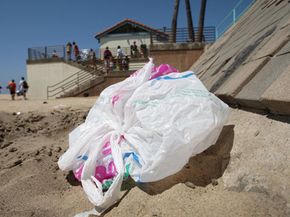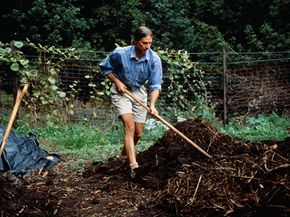In 2007, the environmental movement began to question the sustainability of the polyethylene plastic bag. This is the ubiquitous bag found in grocery stores around the world; small, crinkly and actually recyclable. The big problem with polyethylene bags is that very few people go to the trouble of recycling them. In the U.S., about 1 percent of the 100 billion polyethylene bags used each year get recycled [source: CSM]. Across the globe, they land on beaches, get trapped on shrubs and provide a general hazard for wildlife. What's more, when left to degrade in the sunlight, polyethylene bags take around 1,000 years to fully break down [source: American Green Bag]. When they wind up in landfills, they may not ever break down because sunlight is usually absent in the middle of a pile filled with several tons of trash.
Advertisement
To curb the growing problem of polyethylene bag accumulation, some cities and countries have made it expensive to use them. In 2008, San Francisco passed a law banning plastic shopping bags at its grocery stores and pharmacies. The city followed nations like India, South Africa and Rwanda in its ban. It's not just grocery bags that pose a problem, however. Plastic bags of all stripes are environmentally unsound.
In addition to taking a millennium to degrade, plastic uses petroleum as a key ingredient. The same crude oil that eventually fuels cars as gasoline is also used to produce plastic. Since oil is a non-renewable substance, plastic bags aren't a sustainable product. As we get closer (or have already passed) peak oil -- the tipping point at which our supplies begin to decline -- petroleum is poised to become more valuable as an energy source to help get humanity past its oil addiction. In other words, we're going to need that oil to power the globe in the next few years a lot more than we'll need it to make plastic bags.
Because of the environmentally unfriendly and unsustainable nature of plastic, some manufacturers are looking to better sources of raw materials for plastic production. At least one company has figured out a way to make a plastic that's not only sustainable, it can even be tossed in a compost bin. The secret, it turns out, lies in corn. It's quite appropriate, since one of the company's biggest new clients is a corn chip maker.
Advertisement


